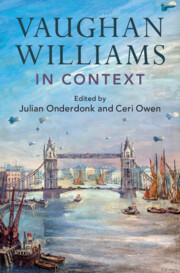Book contents
- Vaughan Williams in Context
- Composers in Context
- Vaughan Williams in Context
- Copyright page
- Dedication
- Contents
- Illustrations
- Graphs and Tables
- Musical Examples
- Notes on Contributors
- Acknowledgements
- Editorial Note
- Bibliographic Abbreviations
- Introduction
- Part I Biography, People, Places
- Part II Inspiration and Expression
- Part III Culture and Society
- Part IV Arts
- Part V Institutions
- Chapter 24 ‘Wanting’ the Home-Grown Composer:
- Chapter 25 Concert Life and Programming
- Chapter 26 The Arts Council and Evolving Public Policy
- Chapter 27 The Second World War:
- Chapter 28 Working with the BBC
- Part VI Reception
- Further Reading
- Index of Works
- General Index
Chapter 27 - The Second World War:
A National Figure
from Part V - Institutions
Published online by Cambridge University Press: 28 March 2024
- Vaughan Williams in Context
- Composers in Context
- Vaughan Williams in Context
- Copyright page
- Dedication
- Contents
- Illustrations
- Graphs and Tables
- Musical Examples
- Notes on Contributors
- Acknowledgements
- Editorial Note
- Bibliographic Abbreviations
- Introduction
- Part I Biography, People, Places
- Part II Inspiration and Expression
- Part III Culture and Society
- Part IV Arts
- Part V Institutions
- Chapter 24 ‘Wanting’ the Home-Grown Composer:
- Chapter 25 Concert Life and Programming
- Chapter 26 The Arts Council and Evolving Public Policy
- Chapter 27 The Second World War:
- Chapter 28 Working with the BBC
- Part VI Reception
- Further Reading
- Index of Works
- General Index
Summary
Throughout the Second World War, Vaughan Williams was not just the ‘grand old man’ of English music but in many ways its leading figure, often serving to represent what was worth protecting and preserving in English cultural life. He and his music were featured extensively on radio and film, and his major work of the period, the Fifth Symphony, was warmly received. The serenity of that work may seem to suggest a certain remove from wartime realities; indeed, his music generally in this period seems out of keeping with the turbulence of the war years. And yet, his vision of music as a source of spiritual sustenance and serenity seemed to find traction in wartime, in a newly powerful way. In the course of the war, he established himself as a cultural figure of national importance in a way that few musicians had before, both building on and reinforcing the growing importance of music itself in wartime life, and serving as a major representative of English and, in turn, British culture to the wider world.
- Type
- Chapter
- Information
- Vaughan Williams in Context , pp. 232 - 238Publisher: Cambridge University PressPrint publication year: 2024

